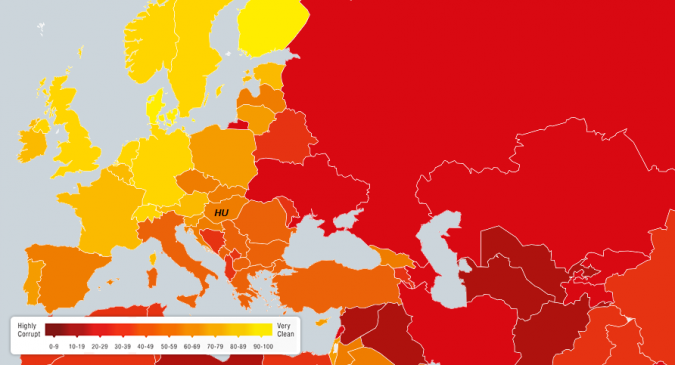Hungary is now the fifth most corrupt country in the European Union, behind only Bulgaria, Greece, Italy and Romania, according to statistics released by Transparency International on Wednesday. The organization’s corruption perception index (CPI) measures trends within the public sectors of countries around the world. While the CPI for 2015 shows an improvement in both Greece and the United Kingdom, Hungary’s score has been dropping since 2012. On a scale of 0 to 100, the higher the number that a country receives, the cleaner the country’s public sector is considered, when it comes to corruption.
On this scale, Hungary scored 51 in 2015. In 2012, the country’s score was 55.
This compares to a score of 91 for Denmark (the “cleanest” country, in terms of public sector corruption), 87 for the Netherlands, 81 for Germany and also the United Kingdom, 76 for neighbouring Austria, 70 for France, 60 for Slovenia and 56 for the Czech Republic. Romania, with a score of 46, is considered more corrupt than Hungary, as is Bulgaria (41) and Italy (44). Greece is also more corrupt, with a score of 46, but has shown significant improvement, considering that its ranking in 2012 was at 36.

Mapping corruption: the deeper the red, the greater the scope of corruption. Hungary is marked with “HU” and is orange in colour. Source: Transparency International.
Denmark is the world’s least corrupt country, while corruption is the most rampant in Somalia.
“The scale of the issue is huge. Sixty-eight per cent of countries worldwide have a serious corruption problem. Half of the G20 are among them,” notes Transparency International. The organization adds that there is a direct correlation between high levels of corruption and many social ills, including higher child mortality, human trafficking, the degradation of the environment, poor education levels and even terrorism.
Since corruption occurs in secret and behind closed doors, measuring it can be tricky. But researchers at Transparency International have found that exploring and assessing perceptions can be one of the best estimates when it comes to measuring or quantifying corruption over a period of time. Transparency International bases its results on data collected over a 24 month period by independent research institutions, focusing on governance and business climate analysis. In addition to the CPI, the Global Corruption Barometer is also produced each year, but this is based on a representative survey of individuals throughout the world.



